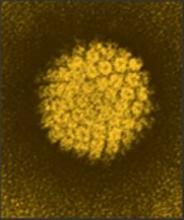An investigational 9-valent human papillomavirus vaccine could prevent up to 85% of invasive cervical cancer, according to a spokesman for Merck, the company developing the product.
The vaccine (V503) adds five new HPV strains to the four already included in the current quadrivalent vaccine. The addition of HPV strains 31/33/45/52/58 should protect against the 30% of cervical cancers that are not caused by HPV 16 and 18, Dr Alain Luxembourg said at a meeting of the Centers for Disease Control and Prevention’s Advisory Committee on Immunization Practices in Atlanta.
"The 9-valent could increase coverage from 50% to 85% of high-grade lesions – which matches the best screening program – and increase the prevention of cervical intraepithelial neoplasia," said Dr. Luxembourg of Merck. "It also provides substantial additional coverage for cervical dysplasia, which will have a lot of potential impact."
The new vaccine has the same aluminum salt adjuvant as the quadrivalent and would be administered on the same three-dose schedule (initial injection followed by others 2 months and 6 months later). It would still be targeted at girls, women, boys, and men aged 9-26 years. In a press statement, Merck said it will submit a Biologics License Application to the Food and Drug Administration by the end of this year. Merck will be seeking a full transition from the quadrivalent vaccine.
The pivotal trial, along with five other phase III safety and efficacy studies, will form the basis of the FDA application, Dr. Luxembourg said at the meeting in Atlanta. All have been completed; two are still in study extension periods. The pivotal trial results will be released next month at a meeting of the European research Organization for Genital Infection and Neoplasia, he noted.
The pivotal trial comprised 14,000 girls and women aged 9-26 years. Because it would be unethical for a control group to take a placebo, all of the subjects received either V503 or the existing quadrivalent vaccine. The main endpoints were noninferior immunogenicity to the four types included in both vaccines. For the newly included strains, the main endpoints were superior efficacy compared with both the quadrivalent vaccine and controls included in the quadrivalent vaccine trials. This was determined by comparing the rates of invasive cervical and vaginal cancer caused by the new types; the rates of cervical, vulvar, and vaginal disease of any grade; 6- and 12-month persistent infections; and PAP abnormalities. The follow-up period is 4.5 years.
Dr. Luxembourg is an employee of Merck.


